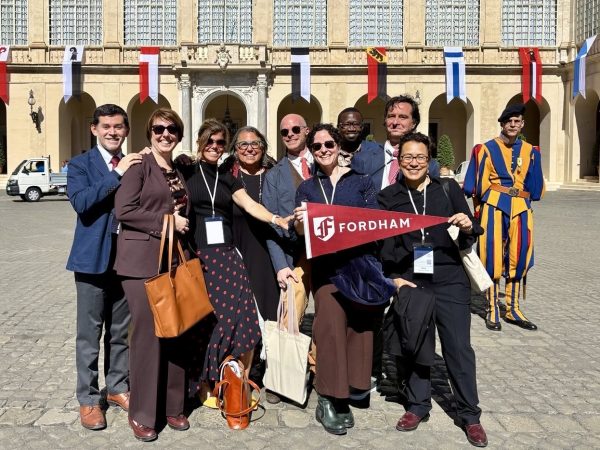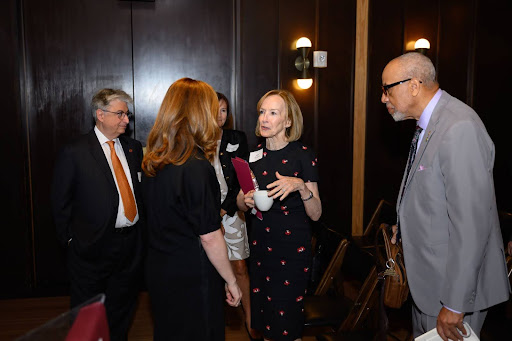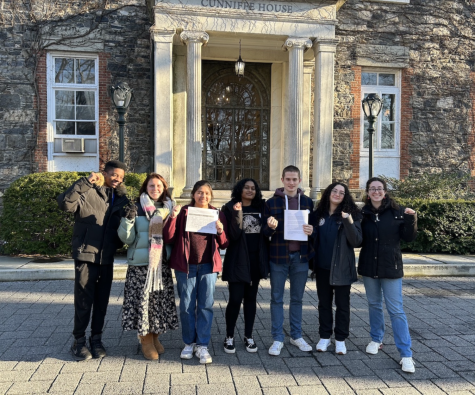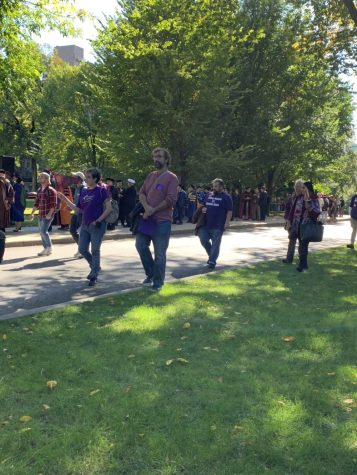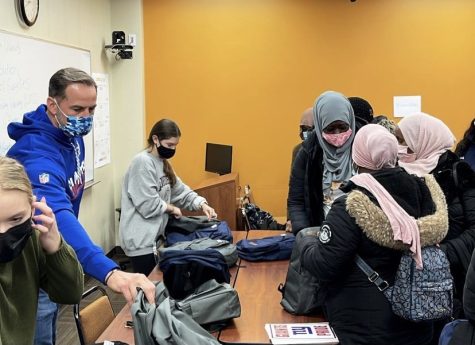Faculty Senate Responds to University’s Freeze of Retirement Benefits
On Oct. 28, the chairman of the Board of Trustees sent an email to the Fordham community announcing the suspension of contribution to the faculty and staff retirement plan. On Nov. 9, the Faculty Senate responded. (Mackenzie Cranna/The Fordham Ram)
The Faculty Senate, which represents the Fordham faculty in dealings with the university, said Monday it is formulating its response to the university’s announcement that it would suspend contributions to the university’s faculty and staff retirement plans. The Senate said the possible actions considered include unionizing the faculty, filing a lawsuit against the university, and dropping some faculty functions by adopting “work to rule.”
The Faculty Senate held a special meeting last Friday to consider its course of action. In a summary of the special meeting, sent to faculty on Monday Nov. 9,the Senate said it received a report from its Salary and Benefits Committee with recommendations concerning how to respond to the end of negotiations and suspension of retirement benefit contributions.
Based on those recommendations, the Senate voted to consult with its external legal counsel concerning the Faculty Salary and Benefits Committee’s recommendations and invite its lawyer to present advice at a meeting on Nov. 13.
Ralf Hepp, an associate professor of economics and chair of the Faculty Salary and Benefits Committee, said the Senate may plan to initiate legal proceedings because they believe the university made a unilateral decision when it cut retirement benefits and violated university statutes.
“The financial argument here is really secondary to the fact that our statutes were violated,” said Hepp.
The summary also said the Senate voted unanimously to authorize the Senate president and Salary and Benefits Committee chair to form an “ad hoc committee of faculty members and to charge them with developing draft guidelines for faculty to ‘work to rule,’ while preserving the faculty’s unchanging commitments to educate, mentor, and advise students and to engage in the work of anti-racism.”
Lastly, the Senate voted that the Salary and Benefits Committee should prepare a response to an email sent by Rev. Joseph M. McShane, S.J., president of the university, on Nov. 3 to the Fordham community regarding why the university would no longer contribute to retirement plans.
According to Hepp, the university said in April it had a $105 million gap in the budget because of the pandemic. The university instituted a salary freeze, a hiring freeze and a suspension of travel, which it said closed the gap to $16 million. In September, the university approached the Senate and said that it wanted to suspend retirement contributions for all employees across the university.
The Senate and the administration had signed a memorandum of agreement in February regarding the next three years of salary and benefits. Despite that agreement, the administration asked for a salary freeze in April because of the budget gap then asked to reduce contributions to retirement benefits in September, according to Hepp.
“Part of the memorandum of agreement stated that we’re keeping all of the terms the same which included the retirement benefits,” said Hepp. “This was the second time that they wanted to renegotiate this memorandum of agreement and the statutes spell out that whenever there’s any changes to any of our salaries or benefits, it needs to be negotiated between administration and faculty.”
The Salary and Benefits Committee requested detailed budget information from the administration as part of its negotiations and Hepp said it found built-in cushions in the budget. Hepp said the committee was willing to agree to suspending retirement benefits if the administration agreed to conditions where they were contractually obligated to repay the retirement benefit contributions later.
He said they were later informed that the university would no longer be contributing to retirement plans, despite the negotiations being in progress, and would not commit to repaying any retirement benefits cut in the future.
Hepp said the Salary and Benefits Committee’s main complaint is the fact that the administration violated university statutes by making a unilateral decision.
“The reason why we think we should have been involved much more than we actually have is because our University statutes spell out that we’re sharing governance with the administration,” said Hepp.
According to Patricio Meneses, associate professor in the department of biological sciences and head of Fordham’s chapter of the American Association of University Professors (AAUP), shared governance is when the Senate and administration work together to come up with a package that works for both parties.
He said while the AAUP is there to support the Faculty Senate, they are always looking for shared governance.
Hepp said the shared governance principle was, in essence, violated.
“What does a contract mean or a memorandum of agreement mean if one party can unilaterally change the terms?” he said. “We felt that we were not included in coming up with the budget proposal, helping out with the budget proposal, presenting ideas regarding that, presenting arguments about how else this can be handled.”
According to Bob Howe, assistant vice president for communications, the university’s budget planning process for 2021 contemplated a series of 15 scenarios with varying assumptions around enrollment and online or remote instruction.
“In April, University leadership proposed to the Board of Trustees its most informed projection at the time — a budget that presumed overall enrollments of approximately 88% of prior year enrollments, and an academic year where students would live on campus during one semester but learn remotely in the other, resulting in significantly less net tuition revenue and room and board revenue,” said Howe.
Hepp said their argument is that financial uncertainty is so grave that cutting retirement benefits is the university’s only option.
“If the financial uncertainty is really that grave, then maybe we could slow down construction on campus, maybe we could draw down on unrestricted funds in the university endowment,” he said.
McShane’s email said the vast majority of funds are restricted. Hepp said while that is true, only 75% of the funds are restricted. Out of an $800 million budget, $200 or $300 million are unrestricted, he said.
“We felt, a little bit, that the suspension was really a choice made by the University rather than the only option,” said Hepp.
Meneses said the faculty’s goal is to go back to negotiations and find an agreement rather than have the university make a one-sided decision.
“I think that ideally it would be great to have both parties return to the negotiating table and come up with a solution both parties can agree to,” said Meneses. “Not every party may get everything that they want, but in these trying times an agreement is what’s best for both parties and Fordham as whole.”







































































































































































































